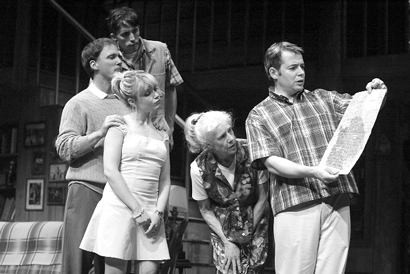Leo Bloom is English this time, but still has a spark for saving the day
“The Foreigner” is what you might call a conventional stage comedy. Conventional, that is, if your idea of a play was formed by B movies from the 1940s.
The humor is pleasant enough, but the evening is suffused with such blandness that while generally not painful, the play is ultimately an exercise in mediocrity. Stereotypical characters meander through a contrived plot, and the comedy, which is largely on a par with “Laverne and Shirley,” is so predictable once the exhaustive—and exhausting—exposition is out of the way, that while one laughs, one (as Queen Victoria said) is not amused.
Charlie Barker has come from England to America on a vacation. His wife lies dying in a hospital so his buddy Froggy thinks a rest in the Georgia mountains would be just the ticket. But Charlie is shy, so he pretends not to speak English, which gets him in Dutch with the denizens of the fishing lodge where he stays but also allows him to foil a nefarious plan to rob an old woman of her home. There are subplots galore, including a visitation from the Klan, a surprise pregnancy, an inheritance and a pile of bricks.
Playwright Larry Shue has tried to knit this all together, but he’s dropped a fair number of stitches and is left with a shapeless mess.
What rescues this production are the performances of a handful of the actors involved. Matthew Broderick as Charlie Baker is doing his trademarked shtick as a man uncomfortable in his own skin and around other people. He is charming, no less so for being completely familiar. It is Leo Bloom from “The Producers” in down-home plaid, but Broderick has impeccable comic timing and an inherent sweetness that makes it impossible to stay truly annoyed with this show. Even as your logical mind is telling you to bolt for the exit, Broderick keeps you there because he’s so much fun to watch.
Mary Catherine Garrison as Catherine, the young woman who becomes pregnant by the Reverend Lee, who is secretly planning to take over the lodge as the Klan headquarters, does the ditzy blond with absolute precision that makes her shine. Likewise, Kevin Cahoon who plays her brother, as a garden variety Southern half-wit, has a wonderful energy and sense of humor that works very well with both Broderick and Garrison.
Unfortunately, the usually wonderful Frances Sternhagen is wasted here. As Betty Meeks, the old woman about to be tossed out of her home, she mugs and bounces her way through the part and while trying to be homespun and adorable comes off as hyperactive and irritating. Lee Tergesen is fine as Owen, the crazy redneck, and Byron Jennings makes the inane part of Froggy, a British soldier for some unknown reason smitten with Betty, actually seem human.
Neal Huff as Reverend Lee is given very little to work with, a thankless part that serves only to advance (or twist) the plot.
The direction by Scott Schwartz is as bland as the show, save for an opening image of Matthew Broderick outside in the rain that mirrored the opening of the thriller “Night Must Fall” of several years ago. While that show was a disaster, with Broderick trying vainly to be evil, “The Foreigner” is merely a disappointment, though that’s bad enough to be sure.
The Immigrant” is a sweet and simple play about the experience of two families in the early 20th century in rural Texas—one Jewish, one Christian. Beginning in 1909 and spanning several decades, the original play by Mark Harelik, based on the true story of his grandfather, had an abiding sweetness, and a wonderful simplicity that made the uncomplicated yet human story deeply touching.
Much of the spirit of the original play—and much of the original script—has been kept as it has been transformed into a musical. Harelik wrote the book, and Steven M. Alper wrote the music to Sarah Knapp’s lyrics.
Happily, what has been maintained is the heart of the piece, and in many cases the score adds richly to the emotions and to the plot. Alper has a wonderful ear for musical styles of the period, which he incorporates into a score that sounds original and contemporary, if not always overtly lyrical and sometimes a little schmaltzy. It is a score that looks for character explication rather than “numbers,” and it is consistently interesting.
The story concerns Haskell and his wife Leah and the relationship that develops between Milton and Ima Perry after the struggling immigrant Haskell begs some water from the Perry’s well. It is a story of the American Dream, though it doesn’t shy away from some of the darker elements of that myth, however lightly they’re developed.
There are strong performances from Walter Charles as Milton and Adam Heller as Haskell, but Cass Morgan as Ima and Jacqueline Antaramian as Leah have the better numbers. Morgan is extraordinary, and Antaramian, as written, emerges in the second act, and she is a wonderful character beautifully portrayed.
As with “The Foreigner,” one could criticize “The Immigrant” for trading in stereotypes, and yet when the underlying story works and the emotions are real and believable, one is always apt to forgive when forgiveness opens the way to feeling.



































